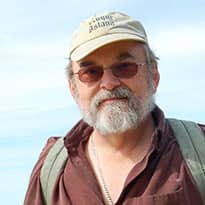This is a really big distinction, one where the bulk of modern transcendental monotheistic religious thinking has an attitude towards nature pretty indistinguishable from that of corporations. It exists for our use and domination. Some people might say that many in the church today are changing in their attitude. This is true but a closer look is fascinating.
As I researched a book I am writing about the 60s, the culture war, and the divine feminine, I discovered something fascinating. Over and over, more liberal Christian traditions beginning to open themselves up to sacred immanence were adopting Pagan symbols and celebrations, and many innovators acknowledged the influence of Pagan thinkers. Starhawk stood out in particular. Our insights are influencing and deepening theirs, just as I think the best Christian's emphasis on care for the unfortunate and weak has had a positive impact on other religions in interfaith work. (But that's another article.)
For us Pagans, most of us anyway, Nature in the broadest sense is the realm of the Sacred. Perhaps some areas are more powerful spiritually than are other areas. That has been my experience. But no place is without a sacred dimension, no place is without a call for our respect and there is no place that will not respond to respectful treatment, though some places respond more quickly than others.
In a society where obliterating mountain tops and filling in valleys with their rubble the better to get at some coal to burn is standard operating procedure, this difference between our views and the historical modern Christian one is a big distinction indeed. I imagine some Christian readers might point out that Pagan societies have done badly with the earth, and they will be right, but will completely miss the point. Not very many Christians were Quakers or of similar strength of belief and compassion and care, and many Christians in this country long actively supported slavery as biblical. Many people do not do a good job of living up to the best insights emphasized by their spiritual path and many societies nominally spiritual are in practice worshippers of power and domination. Their religions are thin icings covering corruption and greed.
But the core insights within a spiritual tradition matter when their practitioners take them seriously, which I think is why the Quakers made such a big impact on slavery. They provided a constant repetition, a constant reminder, by people who are not afraid to be edgy, to bring the less involved members of their broad faith tradition into better accordance with its core values, at least at times. Slavery might have been out of sight, but Quakers did all they could to make sure it was never out of mind.
Most Americans love nature but most Americans believe their love is simply "subjective." As such they are willing to let it go in the name of "progress." They are encouraged in this attitude by both science and the corporate world.
Pagans can play a role here out of proportion to our numbers. We already have. Many old growth redwoods exist today in Northern California because of Reclaiming and other groups' support for bringing an end to the sociopathic actions of Charles Hurwitz's lust for money no matter how much damage was done to others and to the land. Earth First! had a strong Pagan element. But these successes require at least some of us not minding being edgy even as our mainstream becomes more accepted. I think our greatest spiritual contribution is to help others grasp what they already know in their hearts: that nature is worthy of their love, that their experience of Her is more than simple subjectivity like preferring ice cream to cake.
To forestall one likely misunderstanding, I am not criticizing a growing Pagan mainstream that enjoys increasing respectability. Not everyone has the aptitude or time or skills to be effectively edgy, and there are important elements of daily life that limit most people's opportunities to impact issues beyond their immediate circle. Raising a family and keeping food on the table is a big task for many under current American conditions. I honor that.
But just as the edgy can easily fall into fanaticism, the mainstream can get so distracted by the demands of daily life so as to lose sight of larger patterns except purely symbolically. Each dimension of our community has its strengths and each has its weaknesses. Ultimately, each needs the other. I am describing a kind of spiritual ecosystem, and like any ecosystem it should not be a monoculture. As we enter the mainstream ever more successfully, we undermine our long-term viability if we allow that to happen.





